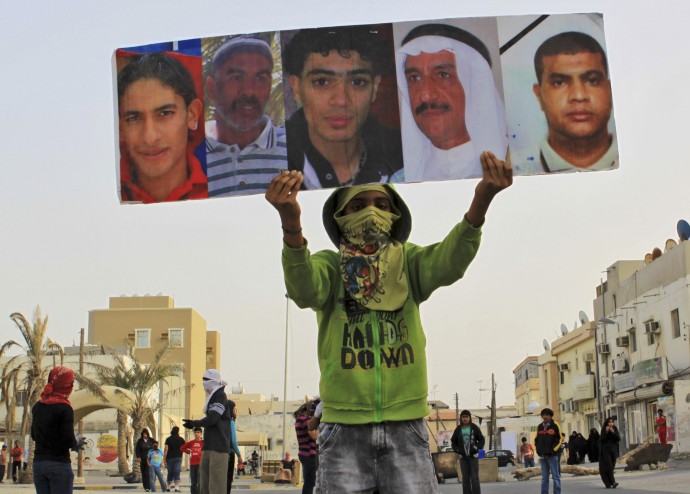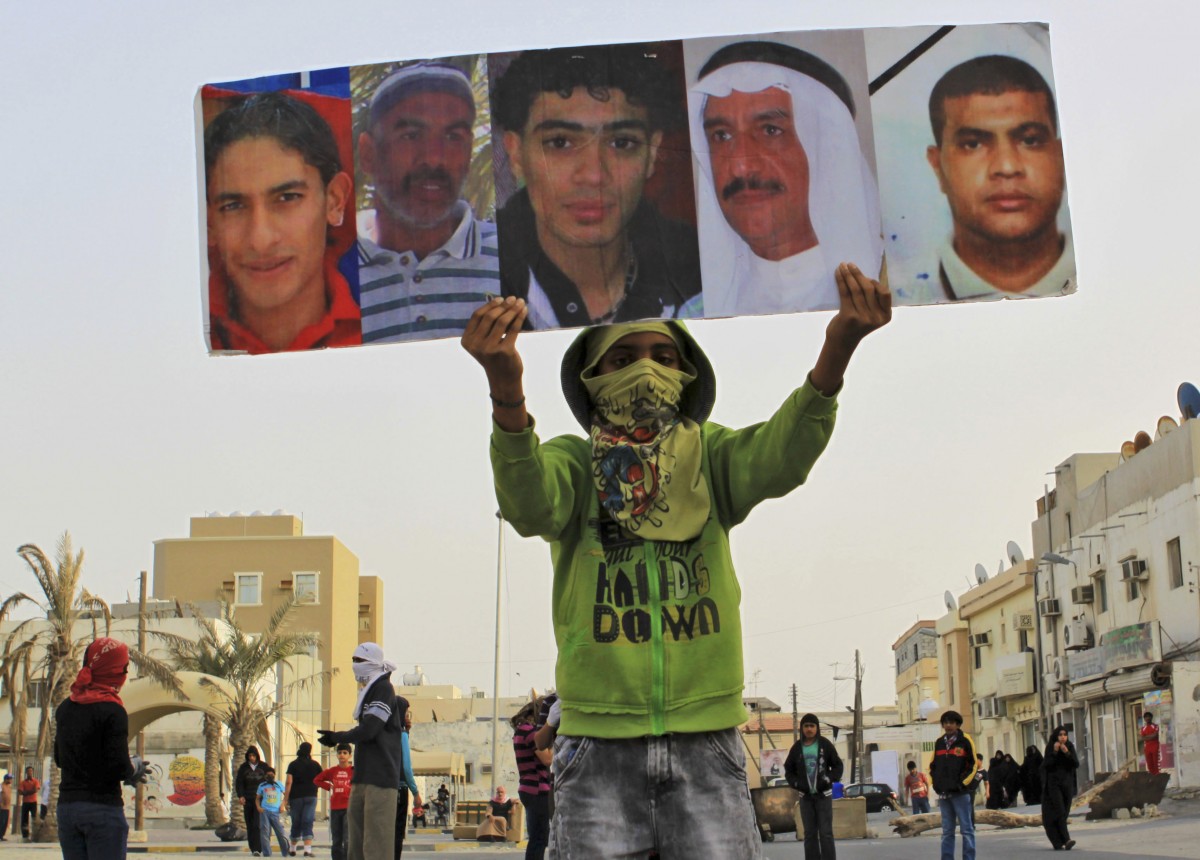
Tens of thousands of Bahrainis took to the streets on Friday, marching along a major highway in the capital city of Manama to demand comprehensive political reforms one year after Gulf Arab states brutally crushed the original uprising.
Conservative estimates report that close to 100,000 protesters took part in the march, which stretched for more than a mile. Other activists believe closer to half of the country’s 525,000 citizens participated. The March 9 protests are believed to be the largest demonstration in Bahrain in the past year.
Security forces reportedly fired tear gas and rubber bullets at protesters who attempted to occupy Pearl Roundabout, the central hub of the February 2011 uprising that resulted in eviction by Saudi and Bahraini military intervention the next month.
Protests began shortly after Shia cleric Sheikh Isa Qassim urged people to reinvigorate the pro-democracy movement and renew calls for the downfall of King Hamad bin Isa Al Khalifa.
“We are here for the sake of our just demands that we cannot make concessions over and we stick with them because we have sacrificed for them,” said Qassim during his weekly sermon in the village of Diraz before the march.
Despite some clashes with security forces that were reportedly deployed to block roads leading to the protest site, the march continued with Qassim helping lead the protest.
Nabeel Rajab, president of the Bahrain Center for Human Rights, told Al Jazeera that the message of the protests is that people are unhappy with the government. “We have clear demands: an end to discrimination, a redistribution of wealth and power and[adherence] to the international convention on human rights,” said Rajab.
Saudi Arabia Helps to Quell Protests, Quell Concerns at Home
Among the chants and posters at Friday’s march were banners condemning Saudi Arabia’s interference in the country and the role of Saudi forces in silencing protesters last year when the Gulf Cooperation Council (GCC) deployed Peninsula Shield Force troops to support the monarchy.
A collective of 2,000 troops from Saudi Arabia and other gulf countries entered Bahrain last March to end the protests and claiming that they want to prevent Iran from gaining influence in the region.
With the absence of Saddam Hussein as a buffer between Saudi Arabia and Iran, the Kingdom finds itself in a power struggle against the Islamic Republic. Saudi Arabia believes that Iran is instigating Shia-led protests in Bahrain and across the Gulf to disrupt the power balance in the region.
However, while 70 percent of Bahrainis are Shia, rights groups and Bahraini’s say Saudi Arabia is wrong in labeling the protests in the Gulf region as sectarian. In reality, protesters claim thousands of Sunni’s have taken to the streets in unity with their fellow citizens.
Friday’s protests in Manama may reawaken concerns in the Kingdom of Saudi Arabia depending on whether protests continue or reignite protests in Saudi Arabia as well where the Shia population in the oil-rich east province has historically been oppressed and barred from political activity.
Dissent in Saudi Arabia is not completely divided among religious factions in the eastern province, however, considering the most recent acts of opposition in the Kingdom have occurred in other parts of the country.
Most recently, a man in Saudi Arabia’s southwestern region of Jinaz set himself on fire, mimicking the self-immolation of Tunisian, Muhammad Bouazizi, whose suicide sparked the beginning of the Arab Spring.
In a separate event, hundreds of Saudi women protested against discrimination and mismanagement at the King Khalid University in Abha on Wednesday. At least 50 women were reportedly injured when security forces and religious police intervened.
U.S. Compliant with Bahrain ‘Dictatorship’
The United States has remained relatively silent about the protests in Bahrain and Saudi Arabia, meanwhile providing military and financial support to other protesters in Egypt, Libya, and now Syria.
Instead, the United States recently pushed to close an arms deal with Bahrain, which would provide security equipment that may be used to restrict protesters. The Obama administration has found a loophole in regulations that allow an arms deal to move forward without Congressional approval.
The proposed U.S. arms deal with Bahrain also comes at a time when the American government is feeling particularly threatened by Iran’s nuclear program. The United States Navy base in Bahrain is home to the United States Fifth Fleet and serves as the primary base for naval and marine activities in the region.
The Fifth Fleet is of particular importance to the United States because of its access to the Strait of Hormuz, a vital waterway for one-fifth of the world’s oil, which Iran has previously threatened to close.
The United States is not willing to jeopardize control of its naval base by supporting protesters that have been accused by America’s strongest Arab ally, Saudi Arabia, of being supported by America’s worst regional ally, Iran.
Solidarity with Bahrain
While the United States remains complicit in Bahrain’s human rights abuses, other Arabs in the region as well as groups across the world are stepping up to support the Bahraini people who are seeking freedom.
While Bahrainis marched the streets of Manama on Friday, thousands of Iraqis took to the streets of Baghdad and a half-dozen other cities in solidarity, led by Shiite cleric Moqtada al-Sadr. Protesters in Iraq also allegedly criticized the Arab League for banning Syria from attending an upcoming summit in Baghdad while still allowing Bahrain to participate.
Meanwhile, online hacktivist group, Anonymous, launched Operation Bahrain this week, posting a video of its mission statement on YouTube. According to the video, “Citizens [of Bahrain] whose families have been murdered by the government are arrested, women are raped, tear gas is fired in to homes at night and infants lay dead.”
Anonymous urged the people of Bahrain to keep protesting and vowed to expose the truth about the Bahraini government and the alleged involvement of American PR firms in spreading lies about the uprising. “Continue demonstrating peacefully,” said Anonymous. You have the support of the people of the world and you will have the freedom you deserve.”


